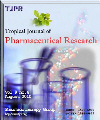
|
Tropical Journal of Pharmaceutical Research
Pharmacotherapy Group, Faculty of Pharmacy, University of Benin, Benin City, Nigeria
ISSN: 1596-5996
EISSN: 1596-5996
Vol. 14, No. 3, 2015, pp. 533-538
|
 Bioline Code: pr15070
Bioline Code: pr15070
Full paper language: English
Document type: Research Article
Document available free of charge
|
|
|
Tropical Journal of Pharmaceutical Research, Vol. 14, No. 3, 2015, pp. 533-538
| en |
Blood Pressure Home Monitoring in Hypertensive Patients Attending a Tertiary Health Facility in Amman, Jordan: Effect on Disease Control and Adherence Rate
Zalloum, Needa A.; Farha, Rana Abu; Ruqa’a, Ala’ M Abu; Khdair, Ayman A. & Basheti, Iman A.
Abstract
Purpose: To investigate the effect of home monitoring of blood pressure (HMBP) on adherence to
antihypertensive medications and control of the disease among patients attending a tertiary health
facility in Amman, Jordan.
Methods: This cross-sectional correlation study was conducted in 2012 at the cardiovascular clinics of
Jordan University Hospital. A questionnaire investigating participants\' disease level of control, disease
duration, frequency of HMBP use, type of measuring devices used, and effect of HMBP on adherence
to antihypertensive medications and life style changes was used for the study. To minimize any bias
that may have resulted from the involvement of pharmacists in data collection, we designed a clear
stringent protocol that was strictly followed by the researcher with all patients. In addition to that, the
researcher clearly introduced herself as an independent figure that cannot make any decisions or
changes.
Results: Two hundred and five hypertensive patients who practice HMBP were recruited into this study.
Sixty percent of the patients were aged 50 - 69 years. About 45 % of the patients were diagnosed with
hypertension for > 10 years. Almost half of the patients have been using digital devices for blood
pressure monitoring. The mean rate of HMBP was 15 times per month but almost 80 % of the patients
did not document their blood pressure readings. Around 55 % of the patients referred high readings to a
healthcare professional. Patients with higher levels of education as well as patients with lower BP
readings showed significantly higher rates of adherence to their antihypertensive medications. Patients
with high BP readings reported that they exercise more and reduced their daily salt intake.
Conclusion: Overall, the patients showed high adherence rates to antihypertensive medications and
adoption of better life style. However, increasing patient’s awareness in respect to documenting and
communicating BP readings to their physicians is needed.
Keywords
Adherence; Hypertension; Compliance; Blood pressure monitoring; Salt intake; Antihypertensive; Jordan
|
| |
© Copyright 2015 - Tropical Journal of Pharmaceutical Research
Alternative site location: http://www.tjpr.org
|
|
